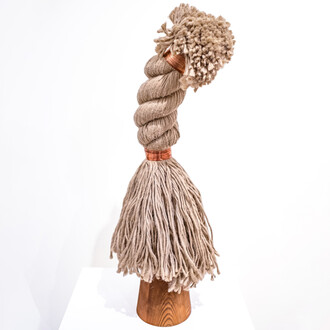One of China's most distinguished artists, resident in Paris since 1986, Ma Desheng was a founder member of the progressive Stars Group which included fellow artists Huang Rui, Wang Keping, Qu Leilei and Ai Weiwei.
In Selected Works 1978–2013 we experience a broad overview of his paintings including his sensuous ink works from the late 1970s as well as his large almost overwhelming paintings of rocks from 2007-2012 and his more recent nudes. His boldly graphic, monochromatic woodblock prints from the late 70s-early 80s, a set of which were recently acquired by the British Museum, will also feature in the show.
As the filmmaker and contributing editor to ArtAsiaPacific, Andrew Cohen, writes in his essay prefacing the specially produced 84 page catalogue that accompanies the exhibition:
Cool and calm on the outside, fiery-spirited on the inside, the radical Beijing-born artist Ma Desheng is as gentle a man as his paintings of rocks are hard edged. Despite his relaxed exterior, Ma’s art is forged through decades of oppression and strenuous commitment to freedom of expression. Like his rocks, beneath the smooth surface simmer passion and pent-up emotions that belie a rebellious nature ready to explode.
Ma Desheng born in Beijing, China in 1952. He is a a self-educated artist and he worked as an industrial draftsman and woodblock print artist before beginning to paint with traditional Chinese ink. He was one of the chief exhibition organizers, in 1979 and 1980, of the Xingxing (Stars) group of avant-garde painters, one of the short-lived associations that made up the Xinchao (New Wave) group of artists. His works are collected by Musee d'Histoire Contmporaine in Paris.
Ma Desheng is an important historical figure. In going against the mainstream, his courage set an example for future generations of artists in China. But, he does not stop there. For Ma Desheng, art counts more than nationality. “First I am a painter,” he says. “Then, I am Chinese. Finally, I live in Paris.” There is an equilibrium between these three notions. The young Ma Desheng is the Ma Desheng of today despite the vicissitudes of life. “For me, nothing has changed. My attitude toward art has not changed either. When you have something in your heart, nothing changes. The sky is always there. Of course, there are wind, snow, clouds, but, the sky and the sun are still there. Between China and here, the language changes; may be the color of the dream has changed; the food changes. But, the roots of and for life are always the same. If you take the war, for example, it was always there and the conditions for war are the same. The only thing that has changed is the passage from stones to planes. But, fundamentally, it is a man who kills a man.”



















